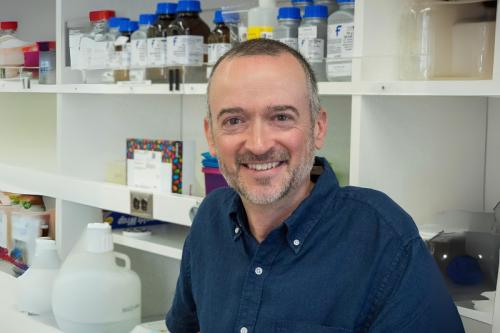
Stuart J. Conway, Ph.D.
- Professor, Chemistry and Biochemistry
- Michael and Alice Jung Endowed Chair in Medicinal Chemistry and Drug Discovery

Stuart Conway, Ph.D., is a medicinal chemist and chemical biologist whose research sits at the interface of chemistry, biology and medicine. He develops molecular tools to enable the study of biological systems, with a focus on epigenetics, hypoxia and proximity induction approaches.
His research contributed to the development of therapeutically relevant bromodomain inhibitors, a promising class of novel anti-cancer drugs that work by interfering in epigenetic processes. The compounds he developed underpin therapeutic candidates that have been tested in clinical trials for cancer.
Conway also collaborated with Ester Hammond, Ph.D., of Oxford University on the development of pro-drugs that are selectively activated in hypoxia – lower than normal levels of oxygen that are a characteristic of solid tumors. Pro-drugs are chemically modified, inactive drugs that are converted into active drugs in the body after administration. The pro-drug approach has the potential to improve the therapeutic window, enhance disease-targeting and increase safety for a number of drug modalities.
His recent work focuses on developing chemical probes that function by inducing proximity between two proteins to alter their function. This includes PROTACs, bifunctional molecules that can selectively degrade harmful proteins in cells, and molecular glues, small molecules that act as adhesives by binding two proteins together.
Research Projects
- Investigating human epigenetic processes in health and disease
- Developing probes to measure and target cellular redox, the balance between oxidizing and reducing molecules in cells
- Studying parasite epigenetics The field of study focused on the dynamic network of chemical compounds surrounding DNA that can influence gene expression without altering the underlying DNA sequence. With modern DNA sequencing technology, scientists can measure epigenetic marks across an entire genome. epigenetics The field of study focused on the dynamic network of chemical compounds surrounding DNA that can influence gene expression without altering the underlying DNA sequence. With modern DNA sequencing technology, scientists can measure epigenetic marks across an entire genome. to develop novel therapeutics for infectious diseases
-
Post-doctoral Fellowship
- Organic Chemistry and Chemical Biology, University of Cambridge, United Kingdom, 2003
Degree
- Ph.D., Medicinal Chemistry, University of Bristol, United Kingdom, 2001

